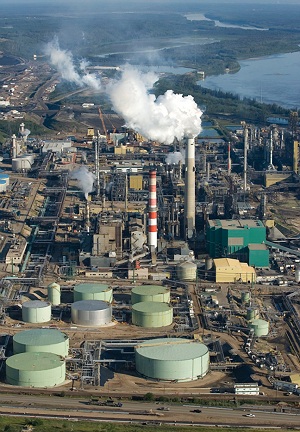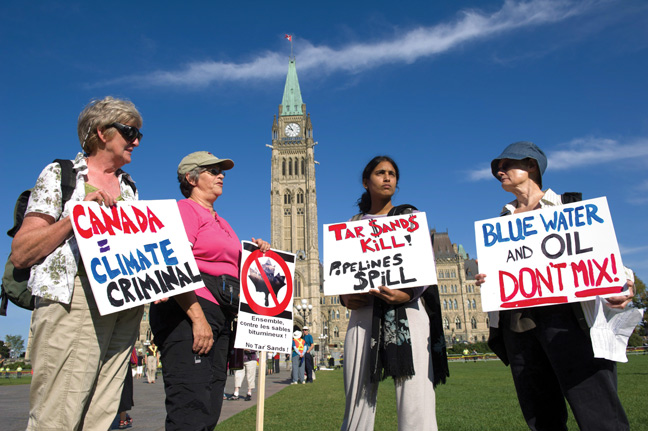
 In their Talking It Over series, Dr. James Read, director of The Salvation Army Ethics Centre in Winnipeg, and Dr. Aimee Patterson, Christian ethics consultant at the centre, dialogue about moral and ethical issues.
In their Talking It Over series, Dr. James Read, director of The Salvation Army Ethics Centre in Winnipeg, and Dr. Aimee Patterson, Christian ethics consultant at the centre, dialogue about moral and ethical issues.
DEAR JIM,
Whether it will happen by pipeline or rail, many of Canada's powerful players are intent on getting the most out of Alberta's oil sands. The reasons are clear: oil sands development turns a tidy profit; it creates a lot of jobs and fuels the economy. But what about the environmental harm it causes? I've been told that there are ongoing efforts to develop technologies that will mitigate the negative impact oil sands production has on the air, land and water. But it's not clear when or even if these technologies will appear. It seems we are quite far along in terms of our economic strategy with little to show in the way of an environmental strategy.
The whole thing seems reckless and, in a way, ironic. The oil industry arose to address a real social concern—the human need for energy. If we're careful, we can use energy for human activities in sustainable ways. But we can also use energy in ways that make life difficult or destroy it. And this is the irony: although the oil sands industry yields something we need to live, its increasing production levels are getting in the way of sustainable living.
I wonder if The Salvation Army feels it has any moral responsibility to engage this problem. Might it advocate that substantial changes be made to any policies and procedures for oil sands development that negatively impact the environment? Might it even encourage divestment from this form of energy production? It sounds radical, but perhaps less so when the connection between social justice and climate justice is recognized.
We minister to people who are marginalized, whose voices are often tuned out by powerful bodies that profit from their marginalization. Shouldn't we do something about this?
AIMEE
DEAR AIMEE,
You say “we [meaning The Salvation Army, presumably] minister to people who are marginalized”—which is true, I hope—but in this case I feel marginalized myself. Maybe not because I am being intentionally ignored by “Big Oil,” but because the issues seem so complex and so convoluted, and change seems so threatening to my present way of life, that I want to ignore it.
I admit that shouldn't immobilize me, however. I may not be in a position yet to say whether The Salvation Army should refuse to invest in any oil sands development firms, but I should do something about my own decision to simply sit on the margins.
To do that, I need to get a better handle on the facts and I need to ask what principles of social ethics apply. You've helped me start.
 Suncor Energy's oil sands upgrader facility near Fort McMurray, Alta. (Photo: © The Canadian Press/Sean Kilpatrick)
Suncor Energy's oil sands upgrader facility near Fort McMurray, Alta. (Photo: © The Canadian Press/Sean Kilpatrick)
I think you're saying there's a need to think long-term, aren't you? To let the distant future have a voice? Currently, political and economic decisions seem to be made to achieve short-term results—profit in the next quarter, success at the polls next year. The present matters—Jesus says, “Don't worry about tomorrow” (Matthew 6:34 NLT)—but the Bible also proclaims God's faithfulness over millennia, “showing steadfast love to the thousandth generation” (Exodus 20:6 NRS). Part of our responsibility is to have our grandchildren's children in mind as we make decisions now.
Another principle, one that gets more serious attention now than it did when I first got into ethics, is to give “the environment” itself a voice. For a long time our society has regarded itself as progressive for saying that all people count. We demanded a principle of regard for the welfare and the rights of all people. But the environment was regarded as merely a resource. Ethical agriculture, for instance, meant making the earth as productive for human beings as it could be. Good mining meant safety for the miners. Basically, you are saying we should also ask what is good for the rivers and the plants themselves. That's a stretch for me. I admit, however, that it forces me to take the Bible's picture of creation more seriously.
I could go on, but let me pause to ask if this is the sort of thing you mean by having an “environmental strategy.”
Meanwhile, I'm going to track down some facts, and search out what the government requires right now by way of an environmental assessment.
Grace and peace,
JIM
DEAR JIM,
I do think that the environment has inherent value. I would defend there being a biblical basis for this right from the beginning. In Genesis 1, God observes the parts of creation to be good. All creation together is deemed very good. Does this mean people can't leave an “eco-footprint” or that we must leave the world exactly as we found it? I don't think so. Never to interact with our environment would be impossible. Moreover, it would mean we could never fully actualize ourselves as co-creators with God. Genesis 1 also recounts God's call to our first parents to fill and subdue the earth. But surely not in devastating ways! Not in ways, as you indicated, that forsake the future in favour of immediate or short-term results. I think the first account of creation reveals that life on earth should be, in part, about healthy, fruitful engagement. It is together that creation is very good.
But the long-term interests I'm concerned about are not only or even primarily environmental ones. Numerous environmental scientists are quick to remind us that the planet will survive our interference—we may not. Even if one doesn't share the view that nature has inherent value, there's reason to be concerned when alarm bells are raised about consequences the oil sands industry poses for the environment. These consequences are also likely to affect human life and communities now and in the future.
Don't get me wrong, divesting from this industry would threaten my present way of life, too. But I think there's something even more important at stake.
Grace and peace,
AIMEE
DEAR AIMEE,
You are absolutely right, the issues are hugely important, and we have to change. I just don't want alarmism from the left or right to close off creative action.
The Sierra Club—which we need to thank for protecting the earth from human predation—calls Alberta bitumen the dirtiest oil in the world. At the same time, scientists say that extracting all the bitumen that is economically feasible to extract would hardly raise global temperatures at all. Consuming the “cleaner” natural gas resources would actually raise temperatures three to eight times as much (Globe and Mail, February 20, 2012).
Bottom line: fossil fuels pollute. They pollute more than some alternatives. We should accelerate a transition.
I was pleased to discover that Alberta is spending more than $6 billion on green technology in the next five years. And I suspect that if investors and ordinary citizens demanded it, that number could be a lot bigger. Have you read about “Masdar City,” the world's biggest experiment in zero-emission modern urban living? Started in 2007, Masdar City is reportedly moving ahead by fits and starts, but it is moving ahead. And note this—it's in Abu Dhabi, a gulf state that is phenomenally wealthy because of oil.
I'm not using this as a justification for burning fossil fuels. Oil and gas don't become cleaner by using profits from them to fund the transition to what is better, but it has the air of something feasible.
With you in prayer and labour for shalom,
JIM
JIM,
I wonder if I'm not expressing myself well.
Why is it considered good enough to dump a little money into green technology when the real bucks are going toward the expansion of the industry? This is tokenism and greenwashing. The priority is economic success, not safe, sustainable economic success.
Put another way: I don't think the problem is oil or even the oil industry. It's about a particular attitude most of us have that rejects the interdependence into which we were created. And the major consequence is not only climate change. It's self-destruction. So I find it strange that environmental conservation is continually linked with a liberal attitude. I guess I always linked it with the attitudes of my grandparents during the Depression: make do or do without.
AIMEE








I may have a very important answer to this by way of what I have been personally working on for 33 years; reducing hydro-carbon combustion pollution.
I have most recently been in discussion with the assistant to the Captain of the local Salvation Army Corps here in Prince George BC Canada; offering to reduce the carbon foot print of the local church buildings dramatically.
With the soon to be completed "Solution 2 Pollution" system!
Doing this both by reducing fuel consumption for heating purposes by 40 > 50%, while providing ... emergency 'stand-a-lone electricity' and at the same time eliminate all of the "Acid Rain" causing GHG's from combustion to be emitted to our atmosphere.
In the market I believe this will become consumer driven because when this method of fuel combustion is applied to transportation the same reduction in pollution results; and the fuel 'energy' efficiency increase is projected to be 25% capitulation will become the norm driven by market forces.
Also; since I am the inventor and the "Solution 2 Pollution" system is my intellectual property it is my intent that all Salvation Army locations world wide would be free to use this innovation "Royalty Free" in terms of any royalty from this payable to me.
Before even fundraising for the 'conversion' of the heating system at 777 Ospika Boulevard here in Prince George is undertaken this system still needs final testing and proving.
I am 62 years old now and have been tirelessly working on this since 1981, and also did preliminary engine tests in 2005 but again ran out of funds.
Even with deteriorating health since 2010 along with struggling and living on welfare or homeless for the last three years I am still intent on seeing this completed and in use ... After all! ... My Grandkids World is at stake! So may I ask that you ... Please support this ... For all of our sake?
Thank You
Willy Ens.